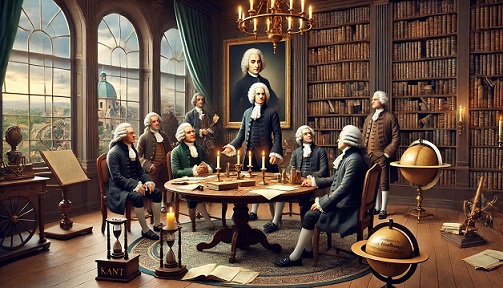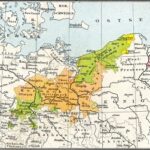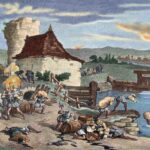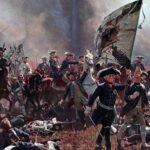
In the 18th century, a new intellectual force swept across Europe: the Enlightenment. Germany, long seen as fragmented and provincial, became one of its most vibrant arenas. From royal courts to tiny universities, from Lutheran parishes to coffee houses, thinkers across the German lands began to question old authorities and champion new ideals—reason, liberty, human dignity, and scientific inquiry.
The Enlightenment in the German states was not merely a copy of French or British models. It had its own flavor—more philosophical, more religiously infused, and more rooted in reform from above. Let’s explore how this era transformed German life, and how its legacy shaped modern Europe.
Intellectual Currents and Key Thinkers
German Enlightenment thought, or Aufklärung, was deeply philosophical and moralistic:
- Gottfried Wilhelm Leibniz laid early foundations in logic, metaphysics, and calculus.
- Christian Wolff systematized rationalist philosophy for broader audiences.
- Immanuel Kant, one of the greatest Enlightenment figures, wrote on ethics, metaphysics, and political reason. His famous slogan: “Sapere aude!” — Dare to know!
- Moses Mendelssohn, a Jewish philosopher in Berlin, advocated religious tolerance and civil rights.
These thinkers promoted a rational, moral order, human dignity, and the potential for societal improvement through education and critical thinking.
Science and Education Reform
The Enlightenment deeply reshaped scientific and educational life in the German world:
- Universities like Göttingen and Halle pioneered scientific empiricism.
- Natural historians like Alexander von Humboldt explored ecosystems and global geography.
- Scientific societies were founded in Leipzig, Berlin, and other cities, where scholars shared research on everything from astronomy to botany.
States like Prussia, under Frederick the Great, reformed education by:
- Standardizing curricula.
- Promoting math, science, and classical languages.
- Reducing clerical control in schools.
Education became a vehicle for social mobility and state modernization.
Political Reform and “Enlightened Absolutism”
In the fragmented German world, many Enlightenment reforms were driven by monarchs and ministers—not by revolution:
- Frederick the Great of Prussia called himself the “first servant of the state.” He:
- Reformed the legal code.
- Promoted religious tolerance.
- Sponsored writers and philosophers, including Voltaire.
- Maria Theresa and Joseph II in the Habsburg lands enacted:
- Religious toleration edicts.
- Peasant reforms.
- Education and health policy reforms.
This mix of royal authority and progressive change became known as “enlightened absolutism.”
Enlightenment and Religion
The Enlightenment did not destroy religion—it sought to rationalize it:
- Pietism, a Protestant revival movement, emphasized moral living and personal faith.
- Clergy were encouraged to be educated, tolerant, and socially engaged.
- Deism—a belief in a creator who does not intervene—gained followers among elites.
While some philosophers were skeptical of Church power, many Enlightenment Germans saw faith and reason as complementary, not contradictory.
Cultural Shifts: Literature, Language, and Identity
The Enlightenment sparked a cultural awakening in the German-speaking world:
- Johann Christoph Gottsched and Gotthold Ephraim Lessing advanced theater and literary criticism.
- A new German literary language began to unify disparate dialects.
- Journals, pamphlets, and novels became popular, especially in cities like Leipzig and Hamburg.
Public debate expanded. The reading public grew, and middle-class audiences demanded access to knowledge, justice, and political accountability.
Legacy and Tensions
The Enlightenment laid the groundwork for profound changes—but also exposed contradictions:
- It championed equality and reason—but did not end aristocratic privilege.
- It promoted tolerance—but Jews and other minorities still faced restrictions.
- It embraced reform—but only within monarchic boundaries.
Yet its influence was unmistakable:
- German states reformed education, science, and administration.
- Intellectuals demanded freedom of thought and expression.
- The foundations were laid for future upheavals, including the Revolutions of 1848 and German unification.
The Enlightenment in the German states was both a cultural revolution and a quiet evolution. While France and America fought for liberty in the streets, German thinkers fought for it in the classroom, the pulpit, and the philosopher’s chair.
Related Topics:
Reformation and Early Modern Period – Explore the major transformations in German history from the 16th to early 19th centuries, including religious upheaval, political change, and cultural milestones.
Martin Luther and the 95 Theses – Discover how Luther’s 1517 protest against indulgences sparked the Protestant Reformation and forever altered the religious landscape of Germany and Europe.
The German Peasants’ War (1524–1525) – A major uprising of peasants and lower classes inspired by Reformation ideals, this war revealed deep social tensions in early modern Germany.
The Thirty Years’ War and Its Impact on Germany – This devastating conflict reshaped Central Europe, leading to massive depopulation, destruction, and long-term political fragmentation in the German lands.
The Peace of Westphalia (1648) – The treaty that ended the Thirty Years’ War established new political boundaries and is considered a foundation of modern international diplomacy.
Rise of Brandenburg-Prussia – Follow the emergence of Brandenburg-Prussia as a rising power in northern Germany, laying the groundwork for future German unification.
German Scientific and Cultural Achievements (18th Century) – Explore the flourishing of music, philosophy, and science in 18th-century Germany, from Bach and Goethe to Kant and Humboldt.
Frederick the Great of Prussia – Examine the reign of Frederick II, a military strategist and Enlightened monarch who modernized Prussia and expanded its influence.
The Napoleonic Wars and the Confederation of the Rhine – Discover how Napoleon’s reshaping of German territories led to the end of the Holy Roman Empire and the formation of a French-aligned confederation.
The Congress of Vienna and the German Confederation – Understand how European powers redrew the map after Napoleon’s defeat, establishing the German Confederation as a loose alliance of states.







